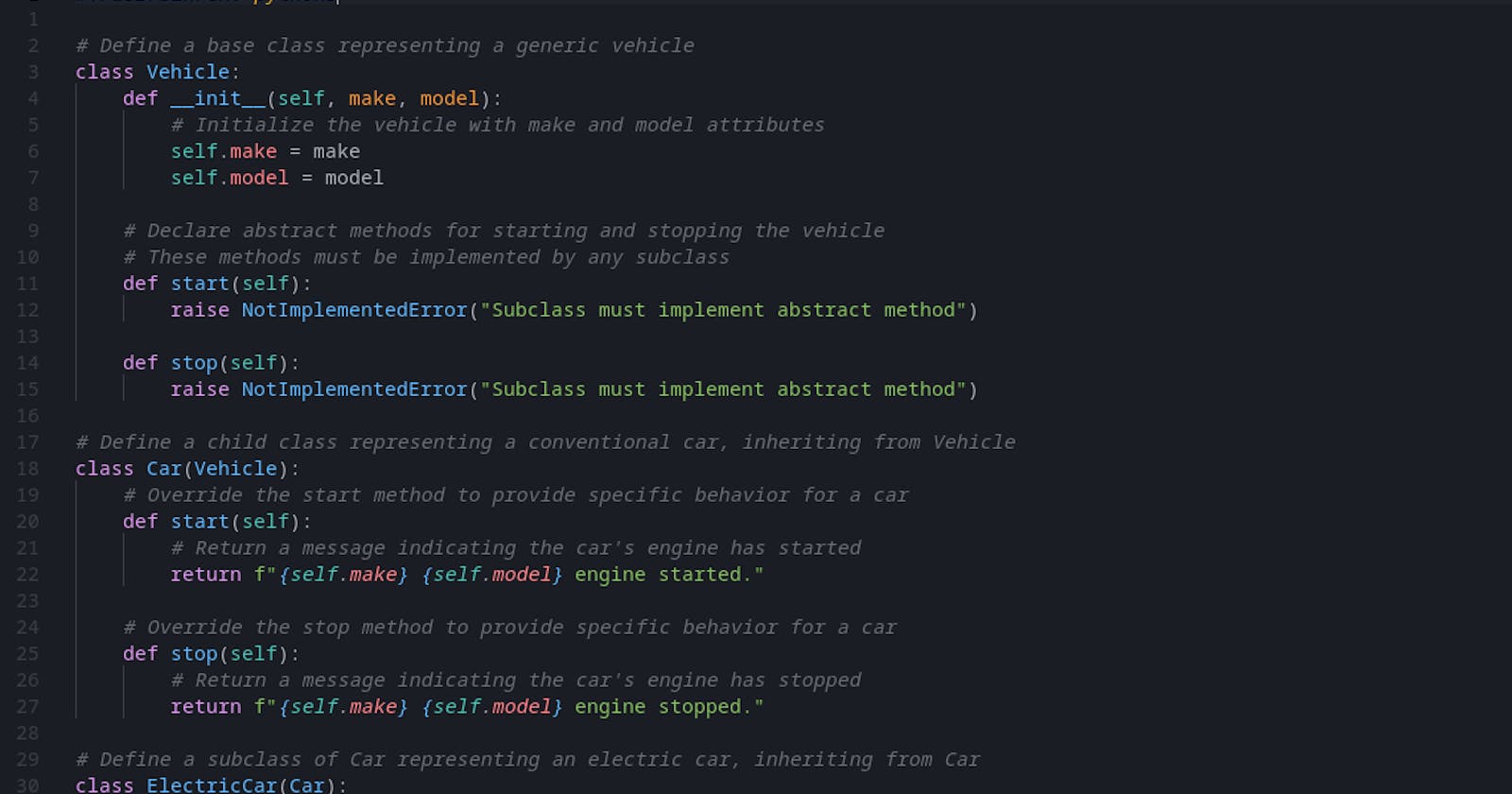Welcome to Object-Oriented Programming (OOP) in Python, a powerful paradigm that allows developers to write more organized, efficient, and maintainable code. This article will introduce you to the foundational principles of OOP and demonstrate their practical applications through Python code examples. Whether you're a seasoned developer or just starting, this guide will help you understand and harness the power of OOP in Python.
Why OOP Matters
Before diving into the nitty-gritty of OOP, let's take a moment to appreciate why this programming paradigm is essential. OOP helps us manage complexity by bundling related data and functions into objects, promoting code reusability and modularity. It's widely used in software development because it can model real-world entities and relationships effectively.
Basic OOP Concepts
Let's begin by exploring the core principles of OOP:
Encapsulation
Encapsulation is hiding internal details and exposing only what is necessary. It enhances security and makes code easier to maintain.
Inheritance
Inheritance allows us to create new classes based on existing ones, inheriting their attributes and behaviors. This promotes code reuse and establishes a logical hierarchy among classes.
Polymorphism
Polymorphism enables us to treat objects of different classes uniformly, making our code more flexible and adaptable to changes.
Abstraction
Abstraction is the process of simplifying complex systems by breaking them down into smaller, more manageable parts. It allows us to hide the implementation details and expose only the necessary functionality to the users.
Now, let's see how these concepts come to life in Python code examples.
# Define a base class representing a generic vehicle
class Vehicle:
def __init__(self, make, model):
# Initialize the vehicle with make and model attributes
self.make = make
self.model = model
# Declare abstract methods for starting and stopping the vehicle
# These methods must be implemented by any subclass
def start(self):
raise NotImplementedError("Subclass must implement abstract method")
def stop(self):
raise NotImplementedError("Subclass must implement abstract method")
# Define a child class representing a conventional car, inheriting from Vehicle
class Car(Vehicle):
# Override the start method to provide specific behavior for a car
def start(self):
# Return a message indicating the car's engine has started
return f"{self.make} {self.model} engine started."
# Override the stop method to provide specific behavior for a car
def stop(self):
# Return a message indicating the car's engine has stopped
return f"{self.make} {self.model} engine stopped."
# Define a subclass of Car representing an electric car, inheriting from Car
class ElectricCar(Car):
def __init__(self, make, model, battery_capacity):
# Call the constructor of the parent class to initialize the make and model
super().__init__(make, model)
# Add an attribute for the battery capacity
self.battery_capacity = battery_capacity
# Override the start method to provide specific behavior for an electric car
def start(self):
# Return a message indicating the electric car's engine has started
return f"{self.make} {self.model} electric engine started."
# Define a unique method for charging the electric car
def charge(self):
# Return a message indicating the electric car is charging
return f"{self.make} {self.model} is charging."
# Create an instance of a conventional car
car = Car("Toyota", "Camry")
# Start and stop the car
print(car.start())
print(car.stop())
# Create an instance of an electric car
electric_car = ElectricCar("Tesla", "Model S", "100 kWh")
# Start the electric car and perform charging
print(electric_car.start())
print(electric_car.charge())
Advanced OOP Concepts
As we move on to more advanced OOP concepts, we'll explore composition and multiple inheritance.
Composition
Composition is the process of combining simple objects to form more complex ones. Let's look at an example where a Driver the object is associated with a Car.
# Define a class representing a driver
class Driver:
def __init__(self, name):
# Initialize the driver with a name attribute
self.name = name
# Define a method for the driver to drive a car
def drive_car(self, car):
# Return a message indicating the driver is driving the specified car
return f"{self.name} is driving {car.make} {car.model}"
# Instantiate a Driver
driver = Driver("Kevin")
# Assign the driver to a car and drive
print(driver.drive_car(car))
Multiple Inheritance
Multiple inheritance allows a class to inherit from more than one parent class. This is particularly useful when a class needs to exhibit characteristics of several base classes.
# Define a class representing a hybrid car, inheriting from both Car and ElectricCar
class HybridCar(Car, ElectricCar):
def __init__(self, make, model, battery_capacity, fuel_type):
# Call the constructors of the parent classes to initialize the make, model, and battery capacity
Car.__init__(self, make, model)
ElectricCar.__init__(self, make, model, battery_capacity)
# Add an attribute for the fuel type
self.fuel_type = fuel_type
# Override the start method to provide specific behavior for a hybrid car
def start(self):
# Return a message indicating the hybrid car's engine has started
return f"{self.make} {self.model} hybrid engine started."
# Define a unique method for refueling the hybrid car
def refuel(self):
# Return a message indicating the hybrid car is refueling with the specified fuel type
return f"{self.make} {self.model} is refueling with {self.fuel_type}"
# Create an instance of a hybrid car
hybrid_car = HybridCar("Toyota", "Prius", "50 kWh", "gasoline")
# Start the hybrid car and refuel
print(hybrid_car.start())
print(hybrid_car.refuel())
Best Practices and Common Pitfalls
When working with OOP, it's crucial to adhere to best practices and be aware of common pitfalls. For instance, favor composition over inheritance when it makes sense, and avoid deep inheritance hierarchies that can lead to tight coupling and maintenance issues.
Conclusion
OOP in Python offers a robust framework for structuring code, making it easier to develop, test, and maintain large software projects. By mastering the principles of OOP, you'll be well-equipped to tackle complex problems and create scalable solutions. Remember, practice is key—keep coding, keep learning, and enjoy the journey of becoming a proficient OOP developer!
